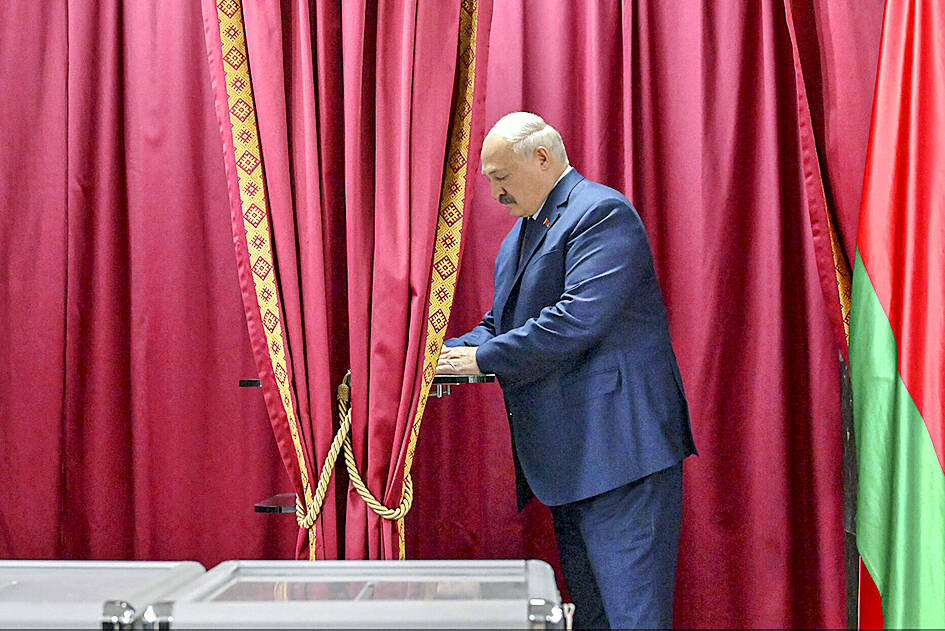Belarusian President Alexander Lukashenko extended his 31-year rule yesterday after electoral officials declared him the winner of a presidential election that Western governments rejected as a sham.
“You can congratulate the Republic of Belarus, we have elected a president,” Igor Karpenko, the head of the country’s Central Election Commission, told a news conference in the early hours of yesterday.
Lukashenko, who faced no serious challenge from the four other candidates on the ballot, took 86.8 percent of the vote, according to initial results published on the Central Election Commission’s official Telegram account.

Photo: Belarusian president’s press service via EPA-EFE
European politicians said the vote was neither free nor fair, because independent media are banned in the former Soviet republic and all leading opposition figures have either been jailed or forced to flee abroad.
“The people of Belarus had no choice. It is a bitter day for all those who long for freedom & democracy,” German Minister of Foreign Affairs Annalena Baerbock posted on X.
Election officials said turnout was 85.7 percent in the election, in which 6.9 million people were eligible to vote.
Asked about the jailing of his opponents, Lukashenko had told a news conference on Sunday that they had chosen their own fate.
“Some chose prison, some chose exile, as you say. We didn’t kick anyone out of the country,” he told a rambling news conference that lasted more than four hours.
A close ally of Russian President Vladimir Putin who allowed the Russian leader to use his country as a staging area for sending troops into Ukraine in 2022, Lukashenko had earlier defended his jailing of dissidents and declared that “I don’t give a damn about the West.”
Exiled opposition leader Sviatlana Tsikhanouskaya said that Lukashenko had engineered his re-election as part of a “ritual for dictators.”
Demonstrations against him took place on Sunday in Warsaw and other eastern European cities.
Lukashenko shrugged off the criticism as meaningless and said he did not care whether the West recognized the election.
The EU and the US said they did not acknowledge him as the legitimate leader of Belarus after he used his security forces to crush mass protests following the last election in 2020, when Western governments backed Tsikhanouskaya’s claim that Lukashenko had rigged the count and cheated her of victory.
Human rights group Viasna, which is banned as an “extremist” organization in Belarus, said there are still about 1,250 political prisoners in his jails, although Lukashenko has freed more than 250 in the past year on what he called humanitarian grounds.
US Secretary of State Marco Rubio on Sunday said that Belarus had “just unilaterally released an innocent American,” whom he named as Anastassia Nuhfer.
He gave no further details about the case, which had not been made public.
The war in Ukraine has bound Lukashenko more tightly than ever to Putin, and Russian tactical nuclear weapons are now deployed in Belarus.

Former Nicaraguan president Violeta Chamorro, who brought peace to Nicaragua after years of war and was the first woman elected president in the Americas, died on Saturday at the age of 95, her family said. Chamorro, who ruled the poor Central American country from 1990 to 1997, “died in peace, surrounded by the affection and love of her children,” said a statement issued by her four children. As president, Chamorro ended a civil war that had raged for much of the 1980s as US-backed rebels known as the “Contras” fought the leftist Sandinista government. That conflict made Nicaragua one of

COMPETITION: The US and Russia make up about 90 percent of the world stockpile and are adding new versions, while China’s nuclear force is steadily rising, SIPRI said Most of the world’s nuclear-armed states continued to modernize their arsenals last year, setting the stage for a new nuclear arms race, the Stockholm International Peace Research Institute (SIPRI) said yesterday. Nuclear powers including the US and Russia — which account for about 90 percent of the world’s stockpile — had spent time last year “upgrading existing weapons and adding newer versions,” researchers said. Since the end of the Cold War, old warheads have generally been dismantled quicker than new ones have been deployed, resulting in a decrease in the overall number of warheads. However, SIPRI said that the trend was likely

NUCLEAR WARNING: Elites are carelessly fomenting fear and tensions between nuclear powers, perhaps because they have access to shelters, Tulsi Gabbard said After a trip to Hiroshima, US Director of National Intelligence Tulsi Gabbard on Tuesday warned that “warmongers” were pushing the world to the brink of nuclear war. Gabbard did not specify her concerns. Gabbard posted on social media a video of grisly footage from the world’s first nuclear attack and of her staring reflectively at the Hiroshima Peace Memorial. On Aug. 6, 1945, the US obliterated Hiroshima, killing 140,000 people in the explosion and by the end of the year from the uranium bomb’s effects. Three days later, a US plane dropped a plutonium bomb on Nagasaki, leaving abut 74,000 people dead by the

Indian Prime Minister Narendra Modi is to visit Canada next week, his first since relations plummeted after the assassination of a Canadian Sikh separatist in Vancouver, triggering diplomatic expulsions and hitting trade. Analysts hope it is a step toward repairing ties that soured in 2023, after then-Canadian prime minister Justin Trudeau pointed the finger at New Delhi’s involvement in murdering Hardeep Singh Nijjar, claims India furiously denied. An invitation extended by new Canadian Prime Minister Mark Carney to Modi to attend the G7 leaders summit in Canada offers a chance to “reset” relations, former Indian diplomat Harsh Vardhan Shringla said. “This is a